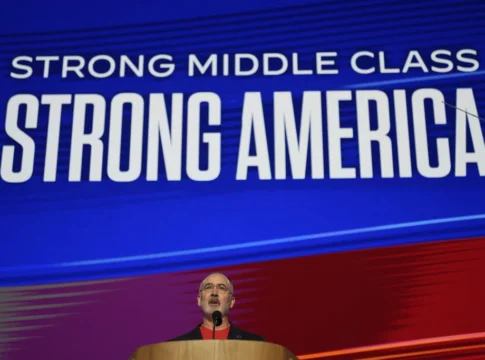This week, Donald Trump gave his clearest answer to date about whether he would enforce the Comstock Act, a 19th-century obscenity law, as an abortion ban. In truth, Trump’s answer was anything but clear: He suggested that “specifics” remained to be determined, but that he “generally” wouldn’t enforce the Comstock Act against abortion pills, whatever that means. This was played up in mainstream media as Trump rejecting the use of Comstock Act as a de facto national abortion ban. They should not have gone so far.
Trump’s statement wasn’t actually all that new: Trump has spent the election season giving muddy answers in the hope of keeping antiabortion voters close without alienating everyone else. But Trump’s latest interview has infuriated key anti-abortion supporters, in the process revealing a major mistake made by conservatives in the aftermath of Dobbs. Abortion opponents were so sure of their chances of continuing to win before a conservative Supreme Court that they unveiled a disastrously unpopular Comstock strategy before an election year. As reaction to the CBS interview suggests, conservatives’ overconfidence might have created a trap that Trump will have trouble getting out of.
The idea for Comstock revival came from Jonathan Mitchell, the former Texas solicitor general, and pastor Mark Lee Dickson, the team behind Texas’s S.B. 8 bounty law, which allows anyone to sue an abortion provider or someone aiding them for at least $10,000. Mitchell and Dickson’s objective was to find a way to bring about an abortion ban that could succeed before the Supreme Court’s conservative supermajority, not to win an election.
That’s where the Comstock Act came in. It was clear that Americans didn’t want a sweeping national ban on abortion. It seemed improbable that Congress would have a large enough Republican majority to pass one in the near term, or that Republicans would prioritize such a move given how unpopular such bans had become.
Mitchell and Dickson argued that there was no need for new legislation because the Comstock Act already was a national ban. The two pointed to language in the statute referring to items or information related to items designed, intended, or adapted for abortion, arguing that the Comstock Act made it a crime to mail or receive abortion drugs or paraphernalia. They contended that the law operated as a de facto ban on all abortions because no procedure in the United States takes place without items shipped across state lines by drug or medical supply companies.
From the beginning, this strategy didn’t seem likely to be a political winner. Americans have become more supportive of abortion rights since Dobbs, with support at near-record highs. And as conservatives interpreted Comstock, it was even more extreme than state bans: lacking exceptions for rape, incest, or even the life of the patient, and applying to women and other abortion seekers. Nevertheless, prominent anti-abortion groups embraced it. So did J.D. Vance and a who’s who of congressional conservatives. Comstock became a cornerstone of Project 2025. A Comstock claim even figured centrally in the Supreme Court’s recent mifepristone case, Food and Drug Administration v. Alliance for Hippocratic Medicine.
All of that speaks to the overconfidence of abortion opponents in the wake of Dobbs. The movement recognized that its best path to victory was to rely on the federal courts and the executive branch because voters seemed irrevocably opposed to anti-abortion leaders’ priorities. And with Trump long leading Joe Biden in the polls, anti-abortion leaders were convinced their candidate would come out ahead. But publicly embracing Comstock because it didn’t require voter support might have been a step too far, especially now that Kamala Harris has replaced the unpopular Biden at the top of the Democratic ticket.
Trump’s campaign was well aware that it wouldn’t do him any favors to embrace Comstock. At the same time, clearly rejecting a Comstock strategy seemed likely to alienate anti-abortion voters already unsure of Trump’s commitment to their cause. Trump tried to thread the needle by avoiding the subject. He went months without saying anything, then promised Time magazine a policy statement on Comstock that never appeared. Most recently, in speaking to CBS, Trump tried the same tactic again. He answered the question but hardly offered any clarity. What does it mean to “generally” avoid Comstock enforcement? That only some doctors or drug companies or patients would be prosecuted? Which specifics remain to be worked out?
With Biden at the top of the ticket, Trump’s efforts to confuse the electorate seemed to benefit him. But now, it looks like Trump might end up with the worst of all possible outcomes. His latest comments were roundly criticized by anti-abortion leaders—including some who had defended Trump in the past.
It would be one thing if Trump were winning over swing voters, especially women, by angering anti-abortion conservatives, but it’s not clear that’s what’s happening. The gender gap—the difference in the stated voting intentions of male and female voters—seems to be at an all-time high. Whatever Trump’s potential appeal to swing voters, it’s likely not his honesty. Given his close ties to the authors of Project 2025, voters may simply not believe his faint-hearted denials about Comstock. At the same time, anti-abortion leaders have grown fed up with what they feel is Trump’s cowardice.
For the moment, abortion opponents’ overconfidence seems to be helping Kamala Harris. But in the longer term, the effects of Trump’s possible backpedaling on Comstock won’t be as straightforward. Jonathan Mitchell famously told Lisa Lerer and Elizabeth Dias of the New York Times that he hoped that anti-abortion groups would “keep their mouths shut as much as possible until after the election.” In some ways, that was the opposite of what happened.
If Trump doesn’t win—or even if he prevails and doesn’t enforce Comstock as strictly as abortion opponents hope—the lesson may well be that Mitchell was right. Publicly detailing plans for Comstock enforcement, like making Project 2025 broadly available, has created an opening for public exposure and criticism.
Since Dobbs, abortion opponents have looked for ways to win without the support of voters. Now, they may be incentivized to hide their plans altogether until well after the election ends.




